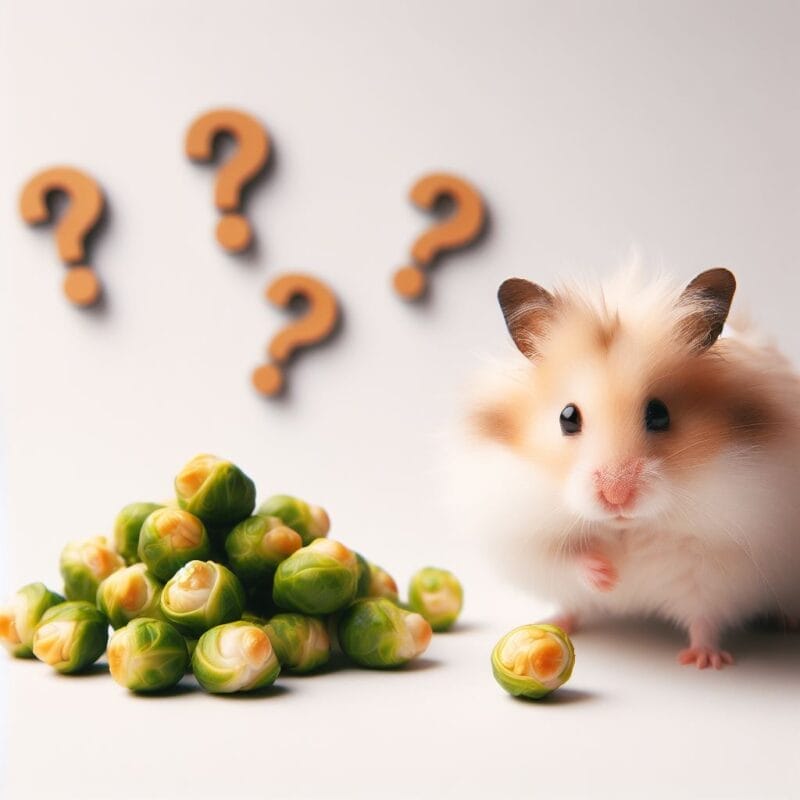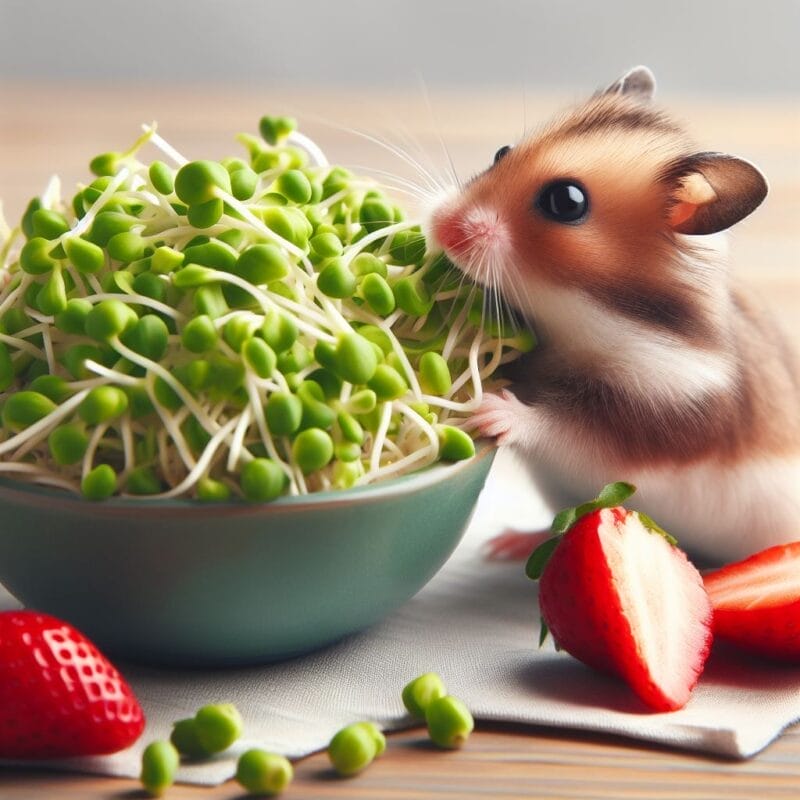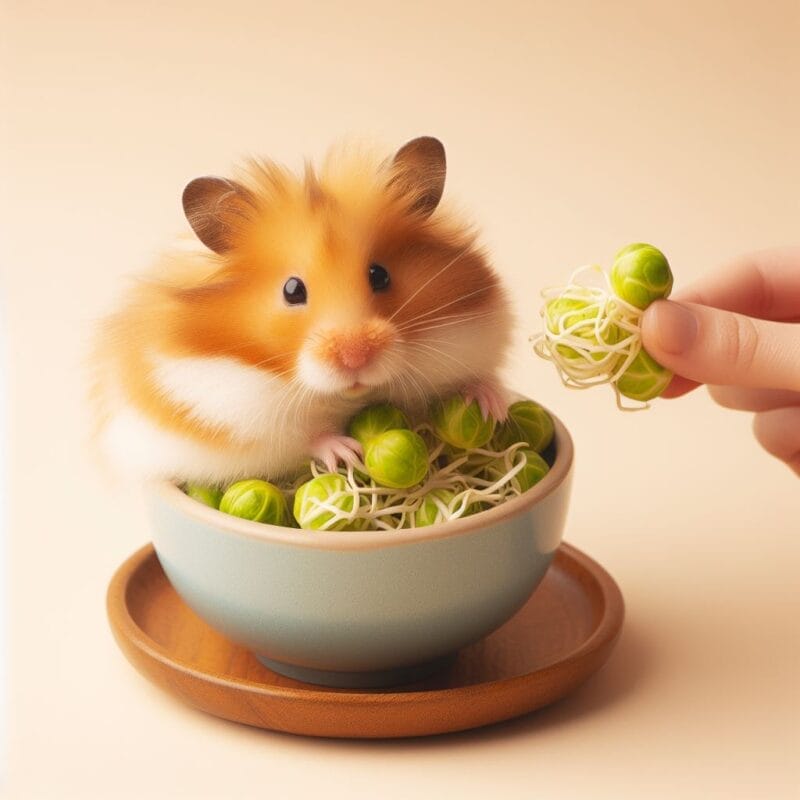Can Hamsters Eat Sprouts? Sprouts are germinated seeds that are picked and eaten after just a few days of growth. They are low in calories but high in nutrients like vitamins, minerals, and antioxidants. Common sprouts include alfalfa, radish, broccoli, peas, and beans.
Can Hamsters Eat Sprouts?
The question about “Can Hamsters Eat Sprouts?” – And answer: Yes, hamsters can eat certain sprouts in moderation. Sprouts provide a wide range of beneficial nutrients that can supplement a hamster’s diet. Just be sure to introduce new sprouts slowly and feed only small amounts to avoid digestive upset.

Can Hamsters Eat Sprouts? The tender, fresh texture and mild taste of most sprouts make them palatable for hamsters. Nutritious sprouts like alfalfa, mung bean, and pea shoots make great options. Overall, sprouts are a safe, healthy food for hamsters when fed properly in moderation as part of a varied diet.
Benefits of Sprouts for Hamsters
Here are some of the main potential benefits sprouts offer hamsters:
- Vitamins – Sprouts provide vitamin C, B-vitamins, vitamin K, and more. Boost immunity and cellular function.
- Minerals – They contain minerals like calcium, potassium, magnesium, and zinc. Support bone health, muscles, and metabolism.
- Fiber – Sprouts have dietary fiber to aid digestion and dental health.
- Protein – Legume sprouts offer plant-based proteins for tissue maintenance and repair.
- Antioxidants – Sprouts are high in antioxidant compounds to reduce oxidative damage.
- Low calorie – The low calorie content prevents obesity.
Can Hamsters Eat Sprouts? So sprouts can provide a wide array of beneficial nutrients to supplement a balanced hamster diet when fed properly.
Risks of Sprouts for Hamsters
However, there are also some potential risks to consider when feeding sprouts:
- Gas or bloating – The high fiber content may cause flatulence, especially when first introduced.
- Diarrhea – Too much sprout fiber could lead to loose stools. Transition slowly.
- Contamination – Raw sprouts can harbor harmful bacteria like salmonella or E. coli if not properly cleaned.
- Dehydration – Their low calorie content may not meet hamsters’ hydration needs.
Can Hamsters Eat Sprouts? Following proper portion guidelines and handling sprouts safely minimizes these risks. Only feed small amounts and monitor your hamster’s tolerance.

Symptoms of Sprout Poisoning in Hamsters
Eating contaminated sprouts or too many sprouts could cause:
- Diarrhea, dehydration, lethargy from foodborne illness
- Excessive gas, loose stools, or constipation from too much fiber
- Reduced appetite or activity level from feeling unwell
Can Hamsters Eat Sprouts? Discontinue feeding sprouts and see your exotic vet if any of these symptoms appear after consumption. Proper hydration, a bland diet, and medication may help resolve symptoms.
How Much Sprouts Can Hamsters Eat?
Feed hamsters just 1-2 teaspoons of sprouts 2-3 times per week maximum. Remove uneaten sprouts within 12 hours.
For a balanced diet:
- High-quality hamster pellets available at all times
- Unlimited timothy hay and chew toys
- Small daily amounts of vegetables and fruits
- Occasional treat proteins like hard-boiled egg whites
- Sprouts should only supplement a hamster’s staple diet, not become the main food.
Sprout Alternatives and Supplements
Can Hamsters Eat Sprouts? For produce variety, also offer:
- Carrot: Rich in vitamin A and beta-carotene
- Cucumber: Helps hydration and offers antioxidants
- Cabbage: Contains vitamins C and K
- Bell pepper: Packed with vitamin C
- Broccoli: Provides fiber, vitamins C and K
- Apple: High in vitamin C and fiber
Quality hamster food brands include:
- Oxbow Essentials Adult Hamster & Gerbil Food
- Supreme Tiny Friends Farm Reggie Rat and Mimi Mouse Food
- Vitakraft VitaNature Dwarf Hamster Food
- Brown’s Tropical Carnival Daily Diet for Hamsters
- Mazuri Rat and Mouse Diet

Can hamsters have sprouts?
Yes, hamsters can eat small amounts of certain raw sprouts like alfalfa, mung bean, and pea shoots 2-3 times per week. Sprouts provide beneficial vitamins, minerals, and antioxidants.
Should I consult a vet before feeding sprouts?
Checking with an exotic vet when making dietary changes is wise, but most approve of limited, safe sprouts for hamsters.
What are symptoms of sprout poisoning in hamsters?
Diarrhea, dehydration, lethargy, bloating, or appetite loss after eating sprouts may signal foodborne illness or overconsumption.
How to introduce sprouts to hamsters?
Start with just a bite or two of sprouts, then slowly increase to 1-2 teaspoons 2-3 times weekly if tolerating them well.
Can Syrian hamsters eat sprouts?
Yes, Syrians can eat small pieces of safe sprouts like alfalfa and mung bean in moderation as part of a varied diet.
Can Roborovski hamsters eat sprouts?
Yes, Roborovskis can eat a pinch of safe sprouts once a week at most. Their small size limits intake.
Can Russian dwarf hamsters eat sprouts?
Russian dwarfs can eat tiny amounts of safe sprouts in strict moderation 1-2 times per week.
Can Teddy bear hamsters eat sprouts?
Yes, Teddy bears can have small pieces of sprouts sparingly, as they are dwarf sized.
Can Chinese dwarf hamsters eat sprouts?
Chinese dwarfs can eat tiny amounts of safe sprouts once or twice a week. But limit portions due to their small size.
Can dwarf hamsters eat sprouts?
Yes, dwarf hamsters can eat small portions of safe sprouts 1-2 times per week maximum. Adjust serving sizes for their tiny size.
Can Hamsters Eat Sprouts? If you take the time to educate yourself about hamster care and respect your pet’s personal space while also giving it adequate hamster breed, hamster food, exercise, and entertainment, as well as maintaining a clean environment and good health, you and your hamster should enjoy a long and happy life together. Visit our site http://hamstercare.net/
